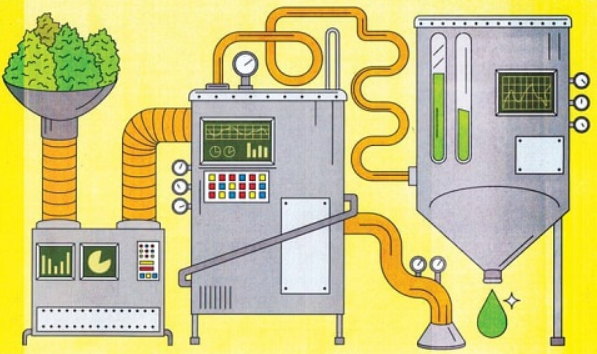Will “Artificial” Cannabinoids Become the New Standard in the Legal Market?
In addition to their role in brewing beer, making cheese, and producing many other foods, yeast can also be used to synthesize THC, CBD, and other cannabinoid compounds under controlled laboratory conditions. Although the legal cannabis market is one of the most promising and profitable industries today, the entire business is still based on cultivating, processing, transporting, and storing cannabis plants. Like any other agricultural crop, this requires significant time and care to produce a high-quality product that meets consumer expectations.
However, a few bold innovators believe they can take the market to a fundamentally new level with a technology that allows for the rapid and efficient production of various cannabinoids—including rare ones—using specially engineered yeast strains and nutrient solutions. Back in early September, the young biotech company Ginkgo Bioworks (which describes itself as specializing in “organism design and architecture”) signed a $100 million partnership agreement with one of Canada’s largest cannabis conglomerates, Cronos Group. Under this high-value contract, Ginkgo will create a new production facility where any therapeutic cannabinoid or terpene can be grown with ease using synthetic nutrient mixes and genetically modified bacteria.
Scientists believe that this technology could meet any demand for cannabinoids, while providing recreational and medical cannabis consumers with products of the highest quality—potentially even surpassing the best plant-derived extracts. Essentially, this new method of producing cannabinoids with yeast works similarly to the natural processes used in brewing beer. Instead of converting sugars into alcohol, genetically engineered microorganisms will consume various organic compounds—from sugars and vitamins to nitrogen molecules—and produce artificial analogs of THC, CBD, and other active substances found in cannabis plants.
In other words, instead of growing cannabis on plantations, inventors propose using large vats filled with a living microenvironment that transforms organic substances into structural and functional copies of any cannabinoid, depending on the biological program encoded in the modified yeast by bioengineers.
“While this plan might sound like a crazy joke, the technology for producing biological compounds with yeast has already been successfully tested multiple times,” says Ginkgo CEO Jason Leber. “If you understand the essence of bioproduction, you’ll see it’s a cheaper and faster alternative to maintaining a commercial indoor cannabis plantation.”
It’s worth noting that modified microorganisms have already been used for several years in the production of pet food and various dietary supplements in several countries. “In this case, citric acid can be produced from any organic compound, not just lemons,” Leber adds with a satisfied smile, hoping this project will showcase the achievements of modern industrial bioengineering.
Besides Cronos Group, Ginkgo also collaborates with several other major international companies outside the cannabis industry. Notable clients and partners include agricultural giants ADM, Cargill, and Bayer Crop Science, as well as the Japanese conglomerate Ajinomoto, which produces instant foods and household chemicals. Ginkgo also has an exclusive contract to present its developments to DARPA, a private technology lab closely working with the Pentagon on defense projects. While most of Ginkgo’s work remains confidential due to business agreements, the company’s website features a detailed presentation of their modified yeast in action, provided by another partner, the French cosmetics corporation Robertet, which commissioned the synthesis of rose water.
Interestingly, Cronos itself approached Ginkgo with the idea of working on cannabinoids during one of the company’s press conferences. Although Leber notes that cannabis contains over 100 complex organic compounds—most of which are cannabinoids—the current focus is on producing just two of the most in-demand substances in the Canadian market: THC and CBD. Still, Leber hopes that after a successful demonstration of the modified yeast to Cronos, the company will allow researchers to begin creating artificial forms of rare cannabinoids, which are difficult to isolate from cannabis due to their extremely low concentrations.
Of course, Ginkgo faces competition from other biotech firms in the cannabis market, all vying for lucrative contracts with major producers. For example, a San Diego-based company called Cellibre recently announced that its own yeast-based biosynthesis technology can offer cannabis cultivators a cheaper and more efficient way to produce synthetic extracts. Cellibre’s CEO, Ben Chiarelli, even compared Ginkgo to insulin manufacturers who once used cow pancreases to make medicine, only to be replaced by companies that learned to produce larger quantities using modified bacteria and yeast.
Meanwhile, other corporations in the legal cannabis market are investing in innovations within more traditional production methods. For instance, earlier this week, Canopy Growth—one of Canada’s top three legal cannabis producers—signed a deal with Colorado-based startup Ebbu to use their new technology for cultivating industrial cannabis strains, aiming to optimize and increase the production of therapeutic CBD extracts. Given that Canada recently fully legalized cannabis, this partnership could net the young company nearly $300 million.
In any case, it’s remarkable that a plant once shunned by authorities and the scientific community for nearly a century due to global criminalization is now the subject of such high-tech developments. While it’s hard to predict whether this radical new method of cannabinoid production will become popular among legal cannabis producers, it’s clear that biosynthesis will soon be widely used for the commercial production of rare cannabinoids with potential medical applications.



